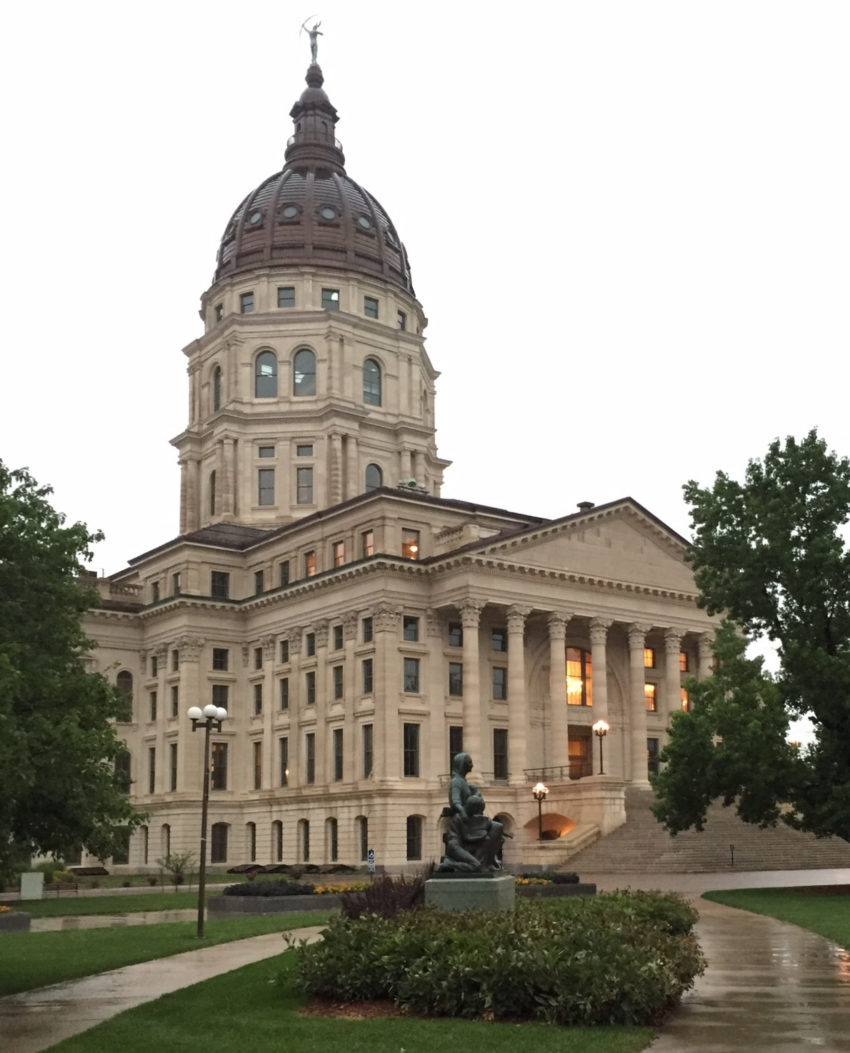Good morning everyone:
The Chiefs don’t play until tonight, so you will have plenty of time to peruse this week’s roundup of Kansas political news. We understand why no one wants to read about politics during a Chiefs game.
As for us, our favorite (but unnamed) team has a bye week, which means it doesn’t drop to 0-5 and so we have plenty of time to get this out to you today before heading to our favorite sports bar.
And just a reminder about our Facebook page, if you can take a minute and give it a “like” it would be much appreciated.
All that said, here are the most significant stories we published last week:
- A press release is driving the debate over how to deal with a state Supreme Court decision throwing out caps on noneconomic damages in personal injury lawsuits.
- House Republicans picked a new consultant to guide them in 2020.
- The battle between Republican leadership in the Legislature and Democratic Gov. Laura Kelly escalated last week when Republican Attorney General Derek Schmidt found that a directive ordering out-of-state retailers to collect Kansas sales taxes was legally insufficient. Kelly and Democratic lawmakers defended the Department of Revenue’s action directing out-of-state retailers to collect the tax.
- The Republican primary in Kansas’ 3rd Congressional District will now include at least three female candidates seeking to unseat Democratic Congresswoman Sharice Davids. Former Roeland Park Mayor Adrienne Foster filed to run in a field that already includes former Kansas Republican Party Chairwoman Amanda Adkins and Sara Hart Weir, former chief executive and president of the National Down Syndrome Society.
- Longtime Democratic state Rep. Jim Ward announced he’s running for the state Senate against Republican incumbent Mike Petersen in District 28 next year. This will be Ward’s second run for the state Senate. He lost to Pat Ranson in 1996.
- A new audit out last week questioned how millions of dollars in economic development funds were spent, concluding the state didn’t provide much of a check on how the money was spent.
- Abortion opponents last week gave lawmakers a broad idea of the language they would like to see in a constitutional amendment reversing a state Supreme Court decision that found the right to an abortion is protected in the state constitution.
- The Corrections Department is breaking new ground with women running three of the state’s eight prisons.
Westar not giving up on coal plant purchase
Westar last week asked the Kansas Corporation Commission to reconsider the utility’s request for ratepayers to cover the cost of buying a share of a coal-fired power plant in Pottawatomie County.
Last month, the KCC rejected the utility company’s request to pass on the cost of not only buying an 8% stake in the Jeffrey Energy Center in St. Marys but also a seven-month lease in the plant.

The KCC said that Westar’s purchase agreement with Midwest Power Co. would have cost ratepayers $93 million in higher rates over the next 15 years.
The commission also found Westar failed to show that the new lease and purchase agreement was a “prudent decision for its retail customers.”
Westar, the KCC said, entered into the agreement knowing it didn’t need the 8% share in the plant to satisfy its capacity requirements and that it would lead to a rate increase for customers.
“We view the transaction to acquire the 8% of Jeffrey Energy Center as a wrap-up of a long-term lease arrangement that has benefitted Westar customers by over $50 million,” said Gina Penzig, spokeswoman for Westar, which now operates as Evergy.
“Unfortunately, the Commission did not see it that way,” she said. “We have requested reconsideration or clarification of the order.”
In its filing, Westar said the KCC incorrectly concluded the utility did not consider alternatives to the 8% purchase and lease in a timely manner.
“The record does not support the conclusion that Westar did not act in a timely manner to explore other available alternatives,” the company said.
“Indeed, no party in the docket alleged that Westar did not act timely to explore alternatives to the settlement with (Midwest Power) and there is no evidence whatsoever in the record on that issue.”
Since no such allegation was made, it should be presumed that Westar acted timely to consider all options, according to the filing.
Westar wants the KCC to reopen the record to take evidence on the issue so it can reconsider its finding.
Kelly vs. Schmidt on immigration
Democratic Gov. Laura Kelly and Republican Attorney General Derek Schmidt are on opposite sides of a U.S. Supreme Court battle that will decide the fate of an Obama-era immigration program.
Kelly and Schmidt have taken up opposing views on the program that allows some immigrants who were brought into the country illegally as minors to avoid deportation and obtain work permits.
Kelly announced last week that she was joining with Michigan, Nevada, Wisconsin and Montana Gov. Steve Bullock in a friend-of-the court brief in support of the Deferred Action for Childhood Arrivals program.
“It goes without saying that we need Washington to finally fix our country’s broken immigration system,” Kelly said in a statement.

“But here in Kansas, we care about the well-being of all of our children,” Kelly said. “We simply shouldn’t punish children for decisions their parents made years ago. That’s not who we are as Kansans.”
The legal brief notes that Kansas has nearly 6,000 DACA recipients who “generate $111 million in annual spending power and pay $12.6 million annually in state and local taxes.”
Meanwhile, Schmidt has signed onto a brief with 11 other state attorneys general and the governor of Mississippi asking the court to allow the program to be rescinded because it wasn’t legally created.
Schmidt said back in August that President Barack Obama’s executive action starting the program “established the cruel illusion of a program that in fact cannot lawfully exist…
“The U.S. Supreme Court should make clear that it is not illegal to cease operating a federal program that was unlawfully created in the first place.
“Perhaps certainty from the nation’s highest court will finally give Congress the will to fix our broken immigration system.”
Lawmakers on red-flag laws
House Speaker Ron Ryckman Jr. and Senate President Susan Wagle headlined a group of about three dozen lawmakers who last week sent a letter to the president opposing red-flag laws.
While expressing sorrow over recent mass shootings, the lawmakers urged the federal government not to overreact by passing laws they say trample on the constitutional right to bear arms.
They emphasized their opposition to so-called red flag laws that permit police or family members to petition a court to remove firearms from someone who may present a danger to others or themselves.
“At the very least, red flag laws erode our fundamental American right to keep and bear arms and our right to due process of law,” the letter said.
“We believe red flag laws could be abused and used to wrongfully target competent, law abiding citizens,” the letter stated.
“We believe that those subject to emergency protection orders under red flag laws are basically guilty until proven innocent thereby destroying due process,” the lawmakers wrote.
The letter created some consternation on social media from Democrats who believe red-flag laws are one way for curbing gun violence.
Democratic state Rep. Brett Parker of Overland Park blasted the letter on Twitter, calling it “shameful.”
“In response to an epidemic of gun violence, they advocate for guns in more places and keeping guns in the hands of those who are (a) danger to others and themselves,” Parker tweeted.
Jo Ella Hoye, former leader of the Kansas chapter of Moms Demand Action for Gun Sense in America and a Kansas House candidate, also criticized the letter on Twitter.
“Family & law enforcement are often the first to recognize when someone is in crisis,” she tweeted. “Red flag laws require due process in courts & can save lives.”
Legislative pay
Annual pay for Kansas lawmakers ranked fifth out of 10 states with part-time legislatures, a new audit shows.
Legislative auditors found that the estimated annual pay of $21,900 for Kansas legislators fell behind other states such as Mississippi ($40,200), West Virginia ($31,900), Utah ($28,600) and Idaho ($26,600) with part-time legislatures.
They used part-time as defined by the National Conference of State Legislatures, based on the hours legislators worked and the number of staff reported.
States with legislative pay less than Kansas were New Mexico ($15,100), Vermont ($14,500), Maine ($13,500), Rhode Island ($12,700) and New Hampshire ($77).
When compared to the five neighboring states, salaries for Kansas lawmakers were on the low end.
The pay in Oklahoma was $50,800, in Missouri it’s $48,800, in Iowa it’s $38,600 and in Colorado it’s $43,500 a year. Only Nebraska was lower at $21,000.
Kansas legislators receive a base salary for each day of the legislative session. That amount is currently set at $88.66 per day, or about $8,200 per year assuming a session lasting 92 days.
They also receive per diem allowance for each day of the legislative session, which helps offsets the costs for meals and lodging.
Per diem in Kansas is currently $149 per day, or roughly $13,700 per year assuming a session lasting 92 days.
Extra pay for legislative leadership, however, was higher than in most other states that auditors reviewed.
The extra pay for the Kansas House speaker and Senate president is $14,000 a year, compared to $16,800 in Oklahoma and $16,200 in Mississippi.
They were higher than in West Virginia ($13,700), Rhode Island ($12,700), Iowa ($12,500), Vermont ($5,000), Idaho ($5,000), Utah ($4,600), Maine ($4,100), Missouri ($2,600) and New Hampshire ($19). New Mexico, Colorado and Nebraska pay nothing extra to the presiding officers.
The majority leader and the minority leader earned more pay in Kansas — set at $12,700 — than any of the 14 other states auditors examined.
Republican state Rep. John Barker of Abilene said lawmakers are hardly getting rich off legislative pay.
“I don’t think you come into this job for the salary,” he said.
“If you do, then I would suggest you go get a minimum-wage job at McDonald’s, because you will make more than you do in the Legislature and get a heck of a lot less headaches.”
The audit also reported that salaries for the state’s six elected statewide officers are lower than in most other U.S. states.
Gov. Laura Kelly earns $99,600 under state law. The only governors who made less are in New Hampshire ($98,700), Wyoming ($97,300), Arizona ($85,000), Oregon ($82,500), Colorado ($78,000) and Maine ($56,900).
Insurance Commissioner Vicki Schmidt makes $86,000 a year, the third lowest salary for insurance commissioners nationally. The only insurance commissioners who made less are in New York ($83,600) and New Hampshire ($82,100).
Attorney General Derek Schmidt earns $98,900 a year, according to the study. His salary was higher than just nine other states’ attorneys general: Utah ($96,800), West Virginia ($94,400), Nebraska ($93,300), New Mexico ($90,300), South Carolina ($88,700), Connecticut ($81,300), Arizona ($80,500), Colorado ($69,300) and Oregon ($68,800).
Republican state Sen. Rob Olson was skeptical of the salary comparisons, saying he wants to know what other financial benefits statewide officials might receive, such as food and lodging, or car and phone allowances.
“They’re not real high,” Olson said of the statewide officials’ salaries. “You’re only getting what the salary is. You don’t know how much per diem, how much mileage, how much other benefits that come with it.
“I have a problem increasing someone’s salary if I don’t have the complete picture,” he said.
In the case of the legislative salaries, Olson said he has seen data in the past that showed them to be high when compared to states that only meet for about 90 days each year.
“I don’t know that it’s accurate,” he said of the study done by legislative auditors. “The stuff I’ve seen before always had us in the 90-day-session group at the very high end.”
Vaping: Downside of regulation
The national campaign to rein in e-cigarettes and vaping-related products may bring with it an unintended tradeoff. Even as serious lung illnesses and deaths tied to vaping spread across the nation, there is a concern that tighter regulation of e-cigarettes — in Kansas and other states — might send consumers back to traditional smoking.
The Associated Press looks at the downside to getting tough with e-cigarettes. The Los Angeles Times also reports on the disadvantages of tighter regulation on e-cigarettes. Here’s a similar report out of Massachusetts from the New York Post. Meanwhile, the number of vaping-related illnesses has climbed to more than 1,000 nationally with 18 deaths.
The Food and Drug Administration last week urged consumers not to use vaping products with THC. Meanwhile, researchers at the University of Kansas Medical Center are using a robot to study the effects of vaping.
More Aetna troubles
Kansas News Service broke this story about how 42 Medicaid beneficiaries lost coverage because of the troubles experienced at Aetna. If you recall, the state has threatened to strip Aetna of its managed-care contract if it fails to correct a number of deficiencies. KNS reported the Kansas Department of Health and Environment had already discovered the cancellations and that coverage has been reinstated.
Moran & Trump
Republican U.S. Sen. Jerry Moran brought U.S. Attorney General William Barr to the state last week. He described the ongoing impeachment inquiry as something that is pulling the country apart. “We have enough problems in Washington, D.C., in working together to get things done,” he told reporters in Topeka, where Barr visited last Wednesday. Here’s coverage from WIBW, The Associated Press and Gatehouse. The attorney general also visited Wichita, where he was not available to reporters.
Pompeo and impeachment
A couple months ago, U.S. Secretary of State Mike Pompeo was seen as the person who could save Kansas’ seat in the U.S. Senate from the Democrats.
But now, Pompeo’s gradually getting entangled in the talk of impeaching Donald Trump over charges the president is pressuring foreign powers to investigate political rivals, especially after Pompeo acknowledged being on a July 25 phone call between the president and Ukraine’s leader.
Here’s the latest news on that front:
- Time magazine looks at Pompeo’s role in the impeachment drama.
- Fox News reports on Pompeo missing a deadline to comply with a subpoena issued by three congressional committees. More on that subject from USA Today, as well.
- Bloomberg looks at the political pitfalls that the impeachment crisis poses for Pompeo. One expert put it this way to Bloomberg about Pompeo: “If he thinks that the Trump ship is going down, then the sooner he gets off the better. But if he thinks they’re going to weather the storm, then he has to wait because if he jumps ship, Trump will come after him.”
- The Associated Press reported Saturday on Pompeo’s defense of Trump’s handling of the call with Ukraine’s leader and how he criticized the impeachment investigation as “silly gotcha game.”
Davids blasts Trump
Well, if Congresswoman Sharice Davids seemed shy at first about calling out President Donald Trump, she’s putting that reputation to rest. Last week, Davids said Trump’s call for China to investigate former Vice President Joe Biden is “a clear abuse of power and far beneath the office of the president.” Here’s coverage from The Associated Press.
Senate VP weighs in on sales taxes
Senate Vice President Jeff Longbine is urging Gov. Laura Kelly’s administration to back off a directive ordering out-of-state retailers to collect Kansas sales tax.
Attorney General Derek Schmidt said in an opinion last week that the Department of Revenue didn’t have the legal authority to issue a notice requiring the out-of-state tax collections.
In an appearance on KVOE radio with Republican state Rep. Mark Schreiber, Longbine said the governor’s policy might invite litigation.
Here’s the radio station’s coverage with sound bites from Schreiber and Longbine.
Judicial candidates recommended
Four candidates have been recommended for the bench in Finney County to replace Judge Michael Quint, who is retiring Dec. 27.
The 25th Judicial District Nominating Commission sent these names to Gov. Laura Kelly to choose from in making the appointment:
- Kristi M. Cott, assistant county attorney, Finney County Attorney’s Office, Garden City.
- Richard L. Marquez, lawyer, Lindner, Marquez & Koksal, Garden City.
- Christopher D. Sanders, district magistrate judge, Finney County, Garden City.
- Brian R. Sherwood, assistant/deputy county attorney, Finney County Attorney’s Office, Garden City.
Kelly has 60 days to decide who will fill the vacancy in the 25th Judicial District, which covers Finney, Greeley, Hamilton, Kearny, Scott and Wichita counties.













